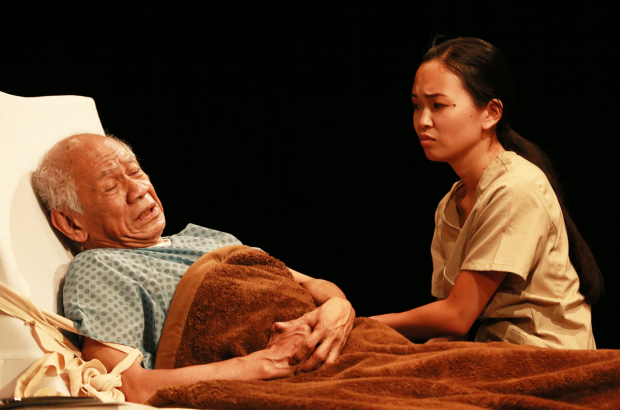As Straw Before the Wind
Felix Racelis’ world-premiere play deals with the struggles of a Filipina nurse.

(© Michael Helms Photography)
It is difficult to revere the creators' intentions for the Ruby Theater's world-premiere production of As Straw Before the Wind at the Ruby Theatre at the Complex, because the story is so muddled. Both of its subjects — post-traumatic stress disorder and the plight of the elderly — deserve to be under the microscope, but this pedantic and draggy play gives neither topic its due.
The elderly-care facility run by Nene Santos (Tita Pambid) has fallen on hard times. Though she wants to expand next door, she can't get a loan and her clients need to share rooms. She has a tumultuous relationship with her meek daughter, Pilita (Sarnica Lim), and does not have the resources to care for her problematic patients, including a cantankerous old man with a wandering hand (Muni Zano) and someone suffering from advanced Alzheimer's (Anita Borcia). Nene loves her daughter and patients, but her nightmarish experience during World War II back in the Philippines affect her nerves and her tolerance. She lashes out in detrimental ways.
Playwright Felix Racelis has not found a way to balance these themes in a way that will successfully hold the audience's attention. The play is presented as a reflection on the Filipino community and the quandary of immigrants, but their nationality in this story is irrelevant for the most part, other than during the fuzzy flashbacks to Santos' time during WWII.
The characters are trite and the dialogue does not help bring them into focus. It is unclear how Racelis feels about them since all the roles are inconsistent. Nene comes dangerously close to abusing her patients. She grabs one tightly by the arm several times and physically restrains another. Despite these actions, the script seems intent on making her the heroine. While there is nothing wrong with creating an anti-hero, as a character Nene Santos is not drawn clearly enough to even qualify as one. The plot points and the histrionics are far too melodramatic to allow the audience to take the story seriously or to invest in the characters.
Director Lesley Asistio keeps the pace slow, which doesn't do the play any favors. Set changes force extended blackouts, sometimes within the middle of a scene, and the audience can see the furniture moved into place as the actors attempt to converse in the dark for several minutes.
Of the performances, only Lim registers as a real person. Her Pilita shows tenderness toward her mother and the patients, and also exudes a feeling of being trapped in her circumstances. But she appears to be miscast since a plot twist near the end would need to make her age around 55 to make any sense, but Lim looks to be around 30, leaving the audience members scratching their heads. The rest of the actors give indifferent performances that would feel more appropriate for a read-through, when it is still OK for them to trip over each other's lines.
As Straw Before The Wind is a direct quote from the Bible's Book of Job that pertains to the rewards of unselfishness versus the punishment of the wicked. Because none of the topics examined in the play — the Filipino-American community, the travesty of war, the necessity to care for our elderly — are focused on with care or integrated together in a coherent way, the title itself leaves audiences questioning the author's intent.









